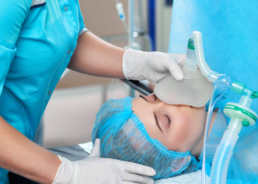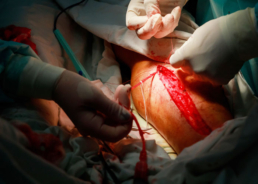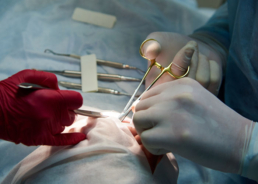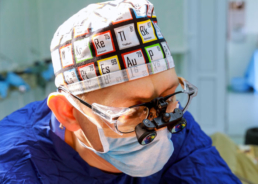Policy Roundtables
Policy Roundtables
Improving surgical outcomes through collaborative research
The NIHR Global Health Research Unit on Global Surgery
Improving surgical outcomes through collaborative research
Policy Roundtables
In eget elit eget odio egestas luctus. Aenean vitae leo porta, vestibulum mauris ut, facilisis arcu. Pellentesque egestas ornare dui non interdum. Nullam a sollicitudin quam, ac bibendum leo. Etiam congue consequat metus quis egestas. Nulla quis faucibus orci. Fusce aliquet tincidunt ante vitae tincidunt. Fusce vitae eros eu nulla volutpat ultricies. Mauris dictum, nisi quis tincidunt egestas, mi nunc iaculis turpis, quis dignissim arcu felis a justo.
" Bringing together surgeons, researchers and policy makers to set the local research agenda according to patient need in LMIC and ensuring all patients have the opportunity to take part in our research. "
John Smith, Head of Research
NIHR Global Health Research Unit on Global Surgery
Reports
Reports
Improving surgical outcomes through collaborative research
The NIHR Global Health Research Unit on Global Surgery
Improving surgical outcomes through collaborative research
Reports
In eget elit eget odio egestas luctus. Aenean vitae leo porta, vestibulum mauris ut, facilisis arcu. Pellentesque egestas ornare dui non interdum. Nullam a sollicitudin quam, ac bibendum leo. Etiam congue consequat metus quis egestas. Nulla quis faucibus orci. Fusce aliquet tincidunt ante vitae tincidunt. Fusce vitae eros eu nulla volutpat ultricies. Mauris dictum, nisi quis tincidunt egestas, mi nunc iaculis turpis, quis dignissim arcu felis a justo.
" Bringing together surgeons, researchers and policy makers to set the local research agenda according to patient need in LMIC and ensuring all patients have the opportunity to take part in our research. "
John Smith, Head of Research
NIHR Global Health Research Unit on Global Surgery
Advisory Board
Advisory Board
Improving surgical outcomes through collaborative research
The NIHR Global Health Research Unit on Global Surgery
Improving surgical outcomes through collaborative research
Advisory Board
In order to improve outcomes for patients, it’s crucial that innovations identified by research are implemented globally. The Board includes representation from the Royal College of Surgeons (England), WHO, The Lancet Commission and the UK Government as well as International Surgical Societies and NGOs.
Policy Implementation
The GSU Advisory Board has been established to work with national governments, professional associations and international organisations (NGOs), to develop evidenced-based recommendations for policy change.
Recommendations are based on cost effectiveness as well as clinical outcomes and will result in changes to surgical practice.


Policy Roundtables
Our policy roundtables provide the opportunity for professionals to take part in our information dissemination outputs in which recommendations for policy makers are discussed. These discussions address various critical issues within global surgery with a focus on LMIC’s.
Bringing together surgeons, researchers and policy makers to set the local research agenda according to patient need in LMIC and ensuring all patients have the opportunity to take part in our research.
Projects
Projects
Improving surgical outcomes through collaborative research
The NIHR Global Health Research Unit on Global Surgery
Improving surgical outcomes through collaborative research
Projects
Patient benefit lies at the heart of our research projects. Through our Hub led wider work on CEI, we are ensuring that context relevant patient and community views inform our projects (and their dissemination) and ensure their relevance, preferences, need and value.
Our CEI Case Studies
Our case studies showcase practical application of CEI in LMIC settings with a focus on exploring best practice and highlighting challenges and barriers, as well as potential solutions. Learn about the tailored CEI activities.
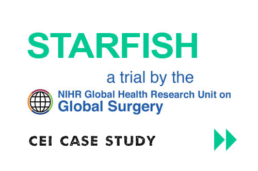
STARFISH: Stoma Care For Improvement Research: Epidemiologic study of stoma cases in The Philippines and qualitative research on the challenges of stoma care.
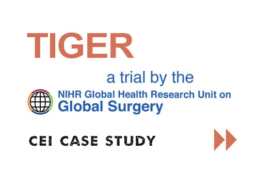
TIGER is a patent randomised trial of NSPs (Non-surgeon physician) undertaking mesh hernia repair following accredited training.’
Bringing together surgeons, researchers and policy makers to set the local research agenda according to patient need in LMIC and ensuring all patients have the opportunity to take part in our research.
CEI Strategy
CEI Strategy
Improving surgical outcomes through collaborative research
GlobalSurg & The NIHR Global Health Research Unit on Global Surgery
Improving surgical outcomes through collaborative research
Community Engagement & Involvement
For GSU, this means working closely with community stakeholders in our LMICs. These stakeholders might be patients and their families, community leaders or generally anyone in the community affected by our surgical research.
To achieve this, we have developed the below outlined overarching CEI strategy – a flexible approach to reaching and establishing ongoing relationships with relevant community members.


Community Engagement and Involvement (CEI) at GSU
“…the process of working collaboratively with and through groups of people affiliated by geographic proximity, special interest, or similar situations to address issues affecting the well-being of those people”
– US Centers for Disease Control and Prevention
The key building blocks are:
1. Each Hub employs a CEI Lead (e.g. a research nurse), who has been trained in best practice CEI according to the UNICEF standards and is responsible for recruitment, training and ongoing support of the community representatives
2. The community representatives are well-connected key stakeholders with reach into grassroots communities
3. The Hub CEI Lead and community representatives meet regularly to form the (virtual) CEI steering committee
4. The steering committee allows us to reach those in the community who are most affected by our research and ensurse they are empowered to contribute towards decision-making
All CEI activities are being captured and evaluated by the UK-based CEI Coordinator, who is also responsible for training, monitoring and shared learning.
Ghana PPI Community Engagement
‘The experiences of the patient and community contributors led to changes in the study protocol (TIGER) such as including women in the patient cohort for the trial, and allowed the GSU teams to confirm the relevance and acceptability of this trial.
These conversations also taught the team a lot about perceptions of health in rural communities, allowed the Ghanaian team to establish relationships with community leaders that can be utilised when future studies need input from the public, and has changed the minds of the Ghanaian research team about the importance of involving patients with research.’
Our CEI Case Studies
Our case studies showcase practical application of CEI in LMIC settings with focus on exploring best practice and highlighting challenges and barriers, as well as potential solutions. Learn about the tailored CEI activities.

CEI Case Study – Starfish: Stoma Care For Improvement Research: Epidemiologic study of stoma cases in The Philippines and qualitative research on the challenges of stoma care.

CEI Case Study – Starfish: Stoma Care For Improvement Research: Epidemiologic study of stoma cases in The Philippines and qualitative research on the challenges of stoma care.
Images from our Community Engagement Projects
Mangement Prog
Mangement Prog
Improving surgical outcomes through collaborative research
The NIHR Global Health Research Unit on Global Surgery
Improving surgical outcomes through collaborative research
Mangement Prog
In eget elit eget odio egestas luctus. Aenean vitae leo porta, vestibulum mauris ut, facilisis arcu. Pellentesque egestas ornare dui non interdum. Nullam a sollicitudin quam, ac bibendum leo. Etiam congue consequat metus quis egestas. Nulla quis faucibus orci. Fusce aliquet tincidunt ante vitae tincidunt. Fusce vitae eros eu nulla volutpat ultricies. Mauris dictum, nisi quis tincidunt egestas, mi nunc iaculis turpis, quis dignissim arcu felis a justo.
" Bringing together surgeons, researchers and policy makers to set the local research agenda according to patient need in LMIC and ensuring all patients have the opportunity to take part in our research. "
John Smith, Head of Research
NIHR Global Health Research Unit on Global Surgery
Senior Directors Prog
Senior Directors Prog
Improving surgical outcomes through collaborative research
The NIHR Global Health Research Unit on Global Surgery
Improving surgical outcomes through collaborative research
Senior Directors Prog
In eget elit eget odio egestas luctus. Aenean vitae leo porta, vestibulum mauris ut, facilisis arcu. Pellentesque egestas ornare dui non interdum. Nullam a sollicitudin quam, ac bibendum leo. Etiam congue consequat metus quis egestas. Nulla quis faucibus orci. Fusce aliquet tincidunt ante vitae tincidunt. Fusce vitae eros eu nulla volutpat ultricies. Mauris dictum, nisi quis tincidunt egestas, mi nunc iaculis turpis, quis dignissim arcu felis a justo.
" Bringing together surgeons, researchers and policy makers to set the local research agenda according to patient need in LMIC and ensuring all patients have the opportunity to take part in our research. "
John Smith, Head of Research
NIHR Global Health Research Unit on Global Surgery
Future Leaders Prog
Future Leaders Prog
Improving surgical outcomes through collaborative research
The NIHR Global Health Research Unit on Global Surgery
Improving surgical outcomes through collaborative research
Future Leaders Prog
The Future Leaders Programme produces new cohorts of surgical research leaders, aiming to provide increased sustainable research leadership capacity and capability.
This will be achieved through the following strands:
- MSc in Global Surgery: GSU Nigeria Hub based at University of Lagos has established an international masters programme.
- PhD in Clinical Sciences: established in GSU Ghana Hub (University of Clinical Sciences, Tamale) – the first of its kind across West Africa.
- MSc in Surgical Science:
15 Hub-UK fellowships offered and all near completion
Further fellowships to be offered to LMIC surgeon trainees from our partner countries.

" Bringing together surgeons, researchers and policy makers to set the local research agenda according to patient need in LMIC and ensuring all patients have the opportunity to take part in our research. "
John Smith, Head of Research
NIHR Global Health Research Unit on Global Surgery
Data Centre
Data Centre
Improving surgical outcomes through collaborative research
The NIHR Global Health Research Unit on Global Surgery
Improving surgical outcomes through collaborative research
Data Centre
The GlobalSurg Data Centre aims to give our collaborators better access to the datasets collected during our international cohort studies. The centre is an online home for the collection, analysis, visulation and reporting of data in our Global Surgery projects. We hope to share data to establish best practice, and ultimately, to improve outcomes for surgical patients worldwide.
At the GlobalSurg Data Centre you can see real time updates on data entry from our current study – at the moment GlobalSurg 3 is collecting data on patients undergoing surgery for breast, gastric and colon cancers. Visit the GS3 in numbers page to see live updates on how many countries are registered to take part, how many teams are actively collecting data and how many patient records have been entered into the study.
As we complete cohort studies we will add applications that allow visualisation and interaction with the complete dataset (please be reassured that we not allow access to patient or hospital level data) – you can see an example of this by visiting the GS2 data explorer. Using this new application, any variable can be compared with any other variable – click the ‘Data’ tab to begin exploring!
We will also be blogging here about all things data – tips on data analysis, how to best present data – if you have a data-related topic you like us to cover, let us know by contacting us!

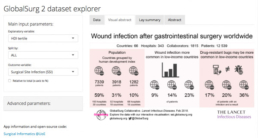
Education Centre
training.globalsurg.org
The GlobalSurg Education Centre provides online training and resources relevant to global surgical research. At the centre you will find open access training materials for our cohort studies and video tutorials on how to use REDCap – our online data entry platform.
We will also be adding modules related to undertaking research wherever you are in the world – these will be open access and freely available to all!

Education Centre Hubs
Lorem ipsum dolor sit amet, consectetur adipiscing elit. Nullam eu semper eros. Pellentesque sit amet nibh et urna sodales scelerisque et sed libero. Ut ante mi, lobortis imperdiet nunc pretium, varius pretium nulla. Etiam quis ipsum eu nunc commodo sollicitudin. Cras iaculis egestas magna, fringilla blandit felis finibus ac. In et eleifend dui. Proin eget volutpat orci. Phasellus a convallis elit. Curabitur ornare enim leo, at blandit metus rutrum vitae.
Lorem ipsum dolor sit amet, consectetur adipiscing elit. Nullam eu semper eros. Pellentesque sit amet nibh et urna sodales scelerisque et sed libero. Ut ante mi, lobortis imperdiet nunc pretium, varius pretium nulla. Etiam quis ipsum eu nunc commodo sollicitudin. Cras iaculis egestas magna, fringilla blandit felis finibus ac. In et eleifend dui. Proin eget volutpat orci. Phasellus a convallis elit. Curabitur ornare enim leo, at blandit metus rutrum vitae.
" Bringing together surgeons, researchers and policy makers to set the local research agenda according to patient need in LMIC and ensuring all patients have the opportunity to take part in our research. "
John Smith, Head of Research
NIHR Global Health Research Unit on Global Surgery
Health Economics
Health Economics
Improving surgical outcomes through collaborative research
The NIHR Global Health Research Unit on Global Surgery
Improving surgical outcomes through collaborative research
Health Economics
Health Economics is the study of how individuals, healthcare providers and governments make health and healthcare decisions in the presence of limited resources. Thus, it applies the general principles of economics to the allocation of scarce resources in health and healthcare. In limited resource settings, appropriate information on the relative clinical effectiveness and cost-effectiveness of health care interventions are vital to support decisions on resource allocation.
In collaboration with the NIHR Global Surgery Unit (GSU) Policy & Implementation Committee, health economic information will be used to guide and support decision making in low- and middle- income (LMIC) settings. To this end, the planned health economic evidence generation includes the undertaking of a range of different approaches such as systematic reviews, economic modelling, cost studies and economic evaluations alongside trials.
Health Economics Research
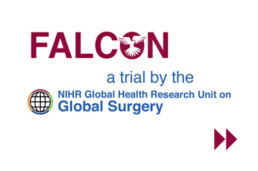
FALCON TRIAL
The FALCON trial looks into the prevention of surgical site infections (SSI) in low- and middle- income countries.
The health economics sub-study within FALCON is named KIWI (Key Resource Use In Wound Infection).
Surgical site infection (SSI) is a worldwide problem which has morbidity, mortality and financial consequences .Previous studies in LMICs on the costs of SSI have been limited by small sample size single-centre hospitals which did not capture costs occurring after hospital discharge. The lack of follow up is a problem as SSI can occur after discharge and costs associated with SSI have been shown to persist beyond 30 days. The main FALCON trial is assessing different treatment combinations to reduce Surgical Site Infection (SSI). The FALCON KIWI sub study is assessing the resource use and costs for patients with and without SSI across several hub countries.
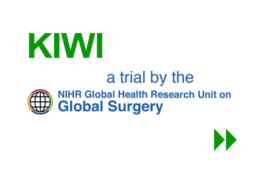
KIWI STUDY
The FALCON KIWI sub study is assessing the resource use and costs for patients with and without SSI across several hub countries. KIWI includes resource use collection (via additional CRFs) up to the 30-day follow-up assessment for patients and extended follow-up for any patients with an ongoing wound infection up to 60 days post-surgery.’
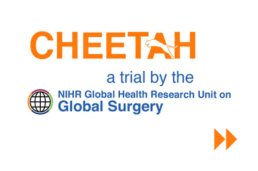
CHEETAH TRIAL
The main CHEETAH trial is assessing whether the practice of using separate, sterile gloves and instruments to close wounds at the end of surgery can reduce surgical site infection at 30-days post-surgery for patients undergoing clean-contaminated, contaminated or dirty abdominal surgery, compared to current routine hospital practice.
Using information from FALCON KIWI and primary data collection in CHEETAH, the cost-effectiveness of the changing gloves/instruments prior to wound closure compared to current routine hospital practice will be assessed.
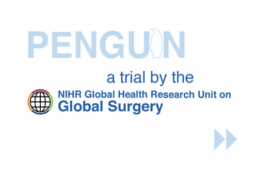
PENGUIN TRIAL
The PENGUIN trial is a 2 x 2 factorial, international pragmatic randomised trial. The trial aims to assess whether preoperative chlorhexidine mouthwash when compared to no-mouthwash-surgery can reduce incidence of post-operative pneumonia (POP) and whether perioperative liberal oxygen versus restrictive oxygen can reduce incidence surgical site infections (SSI) at 30-days among abdominal surgery patients.
Health Economics Activities with Pump Priming Studies at the Global Surgery Unit
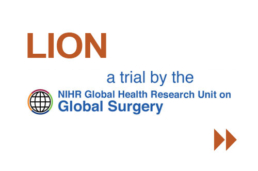
LION STUDY
LION (LaparoscopIc Versus Open Appendectomy): Cost comparison in a lower- middle income setting
This study aims to compare the outcome and cost of conventional open and laparoscopic appendectomy for clinically confirmed, uncomplicated, acute appendicitis in a low resource setting. Although the cost effectiveness of laparoscopic surgery has been investigated previously in high human development index (HDI) countries, similar studies are lacking in low and middle HDI countries.
Led by Dr Adewale Adisa at the NIHR hub in Nigeria, this study will compare outcomes following open and laparoscopic appendectomy in approximately 150 patients at 3 hospitals in Nigeria.
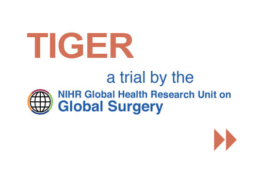
TIGER STUDY
TIGER (Task shifting Inguinal hernia Repair between surgeons and technicians): development of a randomised trial in low and middle income countries
Can technicians perform mesh inguinal hernia repair safely and cost-effectively in rural surgical settings in low and middle income countries?
This pilot trial aims to investigate delivery of a standardised, measurable training programme for technicians to perform a mesh inguinal hernia repair.
Bringing together surgeons, researchers and policy makers to set the local research agenda according to patient need in LMIC and ensuring all patients have the opportunity to take part in our research.



